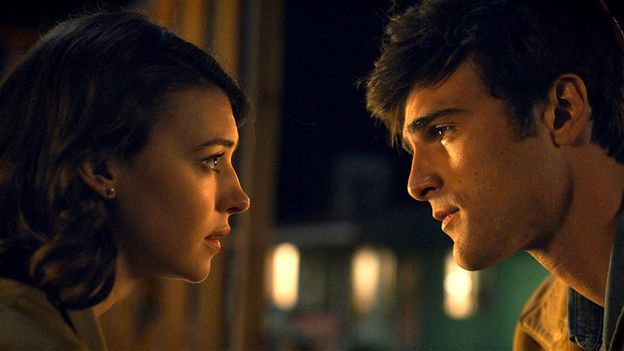Are You Starting To Think The Rat From Flushed Away is Attractive?: The Rise of The 'Rodent Boyfriend'
Juno breaks down the bizarre trend of the 'Rat Men' taking over the internet.
My expectations going into Daniel Minahan’s romantic drama On Swift Horses were admittedly low. I generally think of romance as an entirely overrated genre, not from a pessimistic point of view - I’m a self-proclaimed optimist. I just find that these stories hold unrealistic standards and are overall so devastatingly boring. Paired with what I thought would be a schticky 1950’s Korean War contextual setting, I was bracing myself for a world of cliche suck.
In all honesty, the only thing drawing me towards this movie was seeing Jacob Elordi engaging in some gay for pay. After years of watching him play abusive, debatably queer-coded men spanning multiple decades, I was ready to shake things up a little with some blatant representation, and what time better than during Pride Month?
To my surprise, this movie delivered significantly more queerness and charm than I was prepared to give it credit for. What I assumed was going to be a sibling love-triangle story sprinkled with some queer subtext for extra flavour turned out to be a captivating tale exploring themes of secrecy, agency, and self-discovery. I may be overcompensating, considering this film is quite ordinary - but that is exactly its charm.
I will preface that this film is not a unique feat of queer cinema - whilst it does highlight arguably interesting relationship dynamics between gay and lesbian couples in post-war 1950s, any politically-charged discourse remained either surface-level or entirely nonexistent. This, unfortunately, left me feeling a little empty by the end of the film, with character exploration that somehow felt unfinished despite the film’s fast pacing.

That’s not to say that the characters in this film are void of any development. I found myself compelled by Daisy Edgar-Jones’ portrayal of Muriel, a housewife who is growingly dissatisfied with the mundane nature of her suburban life. It's a cliche trope that skims the surface of second-wave feminism, but it's redeemed through the compelling dynamic of Muriel’s wide-eyed charm and her increasingly iniquitous choices, from secretly betting on horses, to falling in love with her fiance’s (Will Poulter) queer brother while simultaneously harbouring a steamy sapphic affair with her next-door neighbour (Sasha Calle). Her earnest nature endures in spite of her secrecy, which forces you to look past the perceived selfishness of her actions, what some may consider moral failings, I consider an attempt at chasing agency.
Muriel’s actions are inherently selfish, and she is all over the place, overwhelmed with choice from her newfound independence from her husband’s domestic dream that she has been lumped into. Perhaps Muriel seems ungrateful for her husband's support and the ability to afford a new home. While I agree that abandoning these securities is an act of recklessness, I do not fault her. To have agency is to take responsibility for your own actions, which Muriel does, happily, in the film’s abrupt ending. Despite ending up on her own, she is more content than ever.
This theme of compromising hurt for the greater good takes the reins towards the end of the film, particularly in Jacob Elordi’s performance as Julius, brother to Muriel’s fiancé. Julius is the epitome of a gambler, a player of fate who finds love in Henry (Diego Calva) whilst working at a casino in Vegas. Julius’ personal conflict is explicitly more queer than Muriel’s brief lesbian flings. Where Muriel is able to look towards the greater good with minimal destruction, Julius is not afforded that peace. His relationship with Henry fuels the most explicitly political discourse of the film - that as a closeted, Hispanic gay man, Henry cannot afford to sit back and smell the flowers, or calculate his next move with carefulness like Julius; Henry works with urgency until it rips the two apart.
Julius is also inherently selfish - lying, stealing, yet he makes his most selfish decision when he chooses to seek out Henry despite the pain it causes him, both physically and internally. Unlike Muriel, we don’t get to see Julius’ happy ending - I consider the two characters like the yin and yang of the film. Both undertake the journey of self-development under the guise of selfish behaviour, a direct result of the repression of queer joy, a discovery the two both make later in life. Yet this concept of joy isn’t written off as an impossible feat.
The film isn’t some homophobia-ridden trauma porn tearjerker, with both closeted characters ending their journeys with some loosely-open-ended optimism. Though we as an audience do not get to see the results of their labour, we can only assume the two go off to live happy, gay lives. Whilst this does weaken the overall narrative for me, I can appreciate the casual nature in which the underlying queerness of this film was addressed. After all, the gays deserve morally ambiguous, bound-to-be-forgotten wartime romantic dramas too!
Patricia is a fourth-year Media Arts student who spends too much time customising her posters on Letterboxd. You can find her constructing intricate playlists for her comfort characters and attending every single concert she physically can.
Madeline Kahl
Ineke Jones
Juno breaks down the bizarre trend of the 'Rat Men' taking over the internet.
Eloise goes down memory lane to recount some of the best and most iconic Aussie Ads that are etched in all our memories.
Alexa ranks our the childhood cult classic, Papa's Pizzeria games.